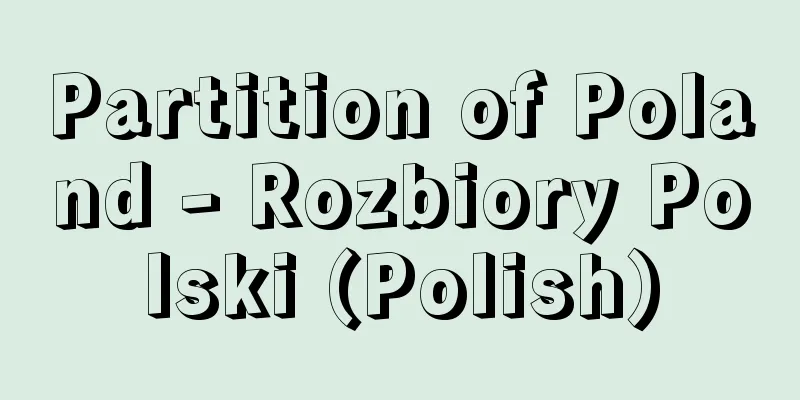Partition of Poland - Rozbiory Polski (Polish)

|
The partition of Poland was carried out three times by Prussia, Russia and Austria in the second half of the 18th century. The Kingdom of Poland, which had begun to decline in the mid-17th century, showed signs of recovery in the mid-18th century, but Catherine II of Russia attempted to make Poland a protectorate through military intervention. Fearing this, Frederick II (the Great) of Prussia invited Austria, which was opposed to Russia's advance into the Balkans, and by various schemes, made Russia give up on making Poland a protectorate, and the First Partition was carried out among the three countries in 1772. As a result, Russia acquired the area north of the Western Dvina River and the upper reaches of the Dnieper River, Prussia acquired Eastern Pomerania (West Prussia) excluding Gdansk, and Austria acquired Galicia. The partition was a great shock to the Poles, and thereafter the momentum for national reform grew even stronger, and reforms influenced by the Enlightenment were promoted. Then, due to rising public opinion and the influence of the French Revolution, the "May 3 Constitution" was enacted in 1791, which abolished the privileges of the szlachta (privileged class) that played a negative role in national politics in the 17th and 18th centuries, and promoted the modernization of society. However, at the request of the conservative szlachta in the country, who were plotting to repeal the new constitution, Russia again intervened militarily, and Prussia also sent troops. At this time, Austria was busy dealing with the French Revolution and could not intervene, so in response to Prussia's request, the two countries concluded the Second Partition Agreement of Poland in January 1793. As a result, Russia received most of Belarus and Western Ukraine, and Prussia received Gdansk and Greater Poland (Poznan). As a result, the Poles, facing a crisis that threatened the survival of their nation, planned an uprising for independence, and in March 1794, the Kościuszko Uprising occurred. The uprising army managed to recover the territory it had before the second partition at the end of April that year, but was overwhelmed and suppressed by the Russian-Prussian allied forces. As a result, the third partition of Poland was carried out by Russia, Prussia and Austria in October 1895, and Poland lost its status as an independent country. [Ichiro Abe] [References] |Source: Shogakukan Encyclopedia Nipponica About Encyclopedia Nipponica Information | Legend |
|
18世紀後半にプロイセン、ロシアおよびオーストリアによって3回にわたって行われたポーランドの分割。17世紀中ごろに衰退の道をたどり始めたポーランド王国は、18世紀中ごろに復興の兆しをみせたが、ロシアのエカチェリーナ2世は武力介入によってポーランドを保護国にしようと図った。これを恐れたプロイセンのフリードリヒ2世(大王)は、ロシアのバルカン進出に反対していたオーストリアを誘い、またさまざまな策謀によってロシアにポーランドの保護国化を断念させ、1772年3国による第一次分割が行われた。その結果、ロシアは西ドビナ川以北とドニエプル川上流域、プロイセンはグダニスクを除く東ポモジェ(西プロイセン)、オーストリアはガリツィアを獲得した。分割はポーランド人に大きな衝撃を与え、その後国政改革の気運がいっそう高まって、啓蒙(けいもう)主義の影響を受けた改革が推進された。そして世論の高まりとフランス革命の影響によって、1791年に「五月三日憲法」が制定され、これによって、17~18世紀の国政上否定的な役割を果たしたシュラフタ(特権的身分)の諸特権が廃止され、社会の近代化が促進された。しかし、新憲法の廃棄をもくろんだ国内の保守的なシュラフタの要請に応じて、ロシアがふたたび武力干渉を行い、これをみてプロイセンも軍隊を送った。このときオーストリアはフランス革命への対応に追われて介入できず、プロイセンの要求に従って、93年1月2国間で第二次ポーランド分割協定が成立した。その結果、ロシアは白ロシアの大半と西ウクライナ、プロイセンはグダニスクと大ポーランド(ポズナニ)を得た。そのため、国家存亡の危機にたたされたポーランド人は独立蜂起(ほうき)を計画し、94年3月コシチューシコの蜂起が起こった。蜂起軍は同年4月末第二次分割前の領土を回復したが、ロシア・プロイセン連合軍に圧倒され、鎮圧された。その結果、95年10月ロシア、プロイセン、オーストリアによって第三次分割が行われ、ポーランドは独立国としての地位を失った。 [安部一郎] [参照項目] |出典 小学館 日本大百科全書(ニッポニカ)日本大百科全書(ニッポニカ)について 情報 | 凡例 |
Recommend
monocyte
…It increases in allergic conditions and myeloid ...
Ribbon - Ribbon (English spelling)
A ribbon-like woven fabric used by women and chil...
Akeris, E.
…American Elizabeth Achelis founded the World Cal...
Okami - Landlady
...In the Kansai region, the same type of face is...
Umeda Underground Mall - Umeda Underground Mall
…The underground spaces of modern cities include ...
Inouzu - Inouzu
This is the common name for the "Complete Sur...
Flower inlay
Flower hairpin. Tang Dynasty Bai Juyi [Song of Eve...
Kazunokogusa - Kazunokogusa
An annual or biennial plant of the grass family (...
Crypto-xanthin
...The color of physalis, chili peppers, egg yolk...
Original Calories
When calculating the energy intake from food, the ...
Santanka (Santanka) - Santanka
Also known as Ixora. An evergreen shrub of the Rub...
Blast furnace
…To make this heat transfer and reaction process ...
Galanthus elwesii (English spelling) Galanthus elwesii
…[Hiroshi Aramata]. … *Some of the terminology th...
Abū Muslim
?‐755 Leader of the Abbasid revolution in Khorasan...
Bank Holiday
…This is called a “pon” (bridge). [Matsubara Shui...









